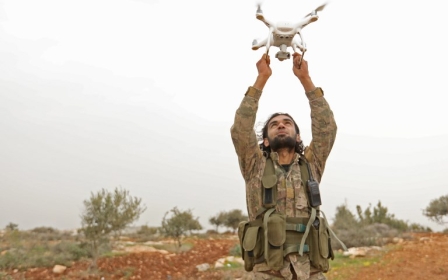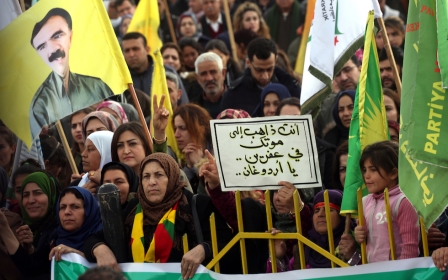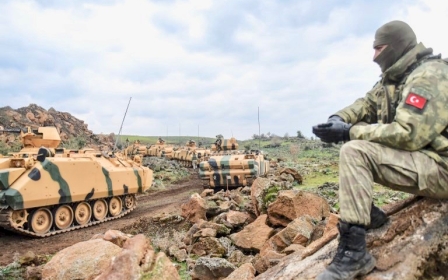Turkey imposes restrictive 'guidelines' on reporting Afrin battle
Government ministers have ordered Turkish media to follow a 15-point guide on reporting the invasion of Afrin, urging them to promote Turkish-made weapons used in the battle, ignore foreign media due to its infiltration by Kurdish sympathisers, and to trust only government statements as true.
Government instructions to Turkish media: 1. It should be reported that this operation is wholly directed against terrorist organisations and the protection of civilians 2. Foreign news sources will use PKK, PYD, YPG and Islamic State sources against Turkey 3. Be aware of Turkey’s national interests when reading international news sources, which may be negative to Turkey 4. Ignore 'information pollution' that depicts attacks on civilians, and remind the audience of the care taken by the army to avoid civilian casualties 5. Emphasise the operation is not just against the PKK/PYD but also IS 6. Video journalists should refrain from visiting conflict zones as reporting endangers soldiers 7. Remind audiences the operation is being carried out with weapons systems designed and built in Turkey 8. Do not publish images that endanger Turkish soldiers and not to share the tactics of the Turkish army 9. Do not consider information obtained from the enemy side as trustworthy 10. Do not draw attention to anti-Afrin operation protests and statements by the domestic political extensions of the PKK 11. Be careful while reporting news of potential martyrs 12. Do not report foreign press reports verbatim 13. Views/quotes should be sought from informed and experienced people 14. Do not report news that boosts the morale of the PKK/PYD 15. Media should contact Bekir Bozdag [deputy prime minister] and Mahir Unal [AKP spokesman] for correct information in order to be able to inform the public. * abridged translation from the original Turkish | |
The list of "expectations" was given to editors and executives in Istanbul at a meeting on Sunday attended by the prime minister, Binali Yildirim, and his defence minister, Nurettin Canikli.
The government invited "opposition" media - organisations refused accreditation and even banned from official events, including OdaTV and Cumhuriyet - to the briefing.
The meeting was held a day after Turkish forces began "Operation Olive Branch" to defeat what it said were terrorist elements in the northern Syrian canton of Afrin.
The Turkish government maintains the Kurdish PYD party and its YPG militia, which control Afrin, are one with the PKK, a group designated as terrorist that Turkey has been fighting for decades.
According to the T24 news website, Yildirim told media representatives that the list was not intended to ban independent reporting. Rather, it was a guide to help media protect Turkey's national interests.
"This is a national issue," Yildirim was reported as saying by OdaTV. "We may have different voices in a democratic country, which is not a problem when everything is going well, but when the world's eyes are on us and we are faced with a matter of survival it is important to be together."
However the list, distributed by Turkish media, shows a range of limitations on reporting on the battle.
The guidelines state clearly that all media should report the operation is against terrorism and to protect civilian casualties.
It warns that foreign press reports will use PKK and Islamic State propaganda and cannot be trusted, and that the only reliable information during the conflict will come from the Turkish government.
It states that the media must state that the operation is not only against the PYD and YPG, but also Islamic State.
It states that television crews should not visit "conflict zones" as they endanger Turkish soldiers, ignore reports of attacks on civilians, and to refrain from reporting on anti-Afrin operation protests in Turkey.
A protest in Istanbul on Sunday evening gained little attention in the Turkish media. In total, 24 people have been arrested for protesting against the operation since it began on Saturday.
The 15-point list says "statements by the domestic political extensions of the PKK" should not be highlighted - a reference to Turkish political parties, such as the HDP, which the Turkish government says supports the group.
But the list also appeared to direct media organisations to promote Turkey's domestic arms industry, by reminding "audiences the operation is being carried out with weapons systems designed and built in Turkey".
That instruction appeared to be followed to the letter by TGRT Haber, a pro-government television network, which used computer graphics to push the message Turkish jets and mobile artillery pieces were being used against Afrin.
The instructions come amid a years-long crackdown on the Turkish media, where newspapers have been closed down, and journalists have been jailed for reporting on the war with the PKK, accused of assisting or belonging to a terrorist organisation.
Meanwhile, the offices of Afrika , a Turkish Cypriot newspaper, were ransacked on Monday - days after Turkish President Recep Tayyip Erdogan slammed its headline referring to "Operation Olive Branch" as a "second invasion" - a reference to the Turkish invasion of Cyprus in 1974.
About 500 protesters, waving Turkish flags and the flag of the breakaway Turkish Cypriot statelet, gathered outside the offices of the paper, throwing eggs, water bottles and stones which smashed the building's windows.
"Allahu Akbar! (God is Greatest!)", they shouted. Some unfurled banners saying: "Afrika newspaper must be shut down immediately". Others carried a huge banner of Erdogan.
Pictures shared on social media showed a crowd waving Turkish flags climbing on the building, before moving inside and destroying equipment and furniture.
Elsewhere on Monday morning two journalists were arrested for reporting news that was alleged to have been in opposition to the invasion of Afrin.
New MEE newsletter: Jerusalem Dispatch
Sign up to get the latest insights and analysis on Israel-Palestine, alongside Turkey Unpacked and other MEE newsletters
Middle East Eye delivers independent and unrivalled coverage and analysis of the Middle East, North Africa and beyond. To learn more about republishing this content and the associated fees, please fill out this form. More about MEE can be found here.




